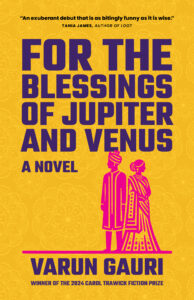-
Varun Gauri
Varun Gauri was born in India and raised in the American Midwest. He now teaches at Princeton University and lives with his family in Bethesda, Maryland. His short fiction was nominated for a Pushcart Prize and recognized in Best American Nonrequired Reading. His debut novel, For the Blessings of Jupiter and Venus (WWPH 2024), won […]continue reading…
What inspired you to start writing creatively, and specifically, to write For the Blessings of Jupiter and Venus?
My parents tried to sell me on a Hindu arranged marriage like their own. I resisted outwardly (my first wife was Jewish) but somehow relented in spirit, essentially sleepwalking, not really believing that marriage was mine to choose, shape, and make. So the seed of the book was an effort to understand what had compelled me about my parents’ arranged marriage, and how and why I fought it. Eventually, I grew fascinated by broader questions about the interplay of compatibility, passion, and acceptance in relationships.
What was the most surprising thing you learned about Avi and Meena, your main characters, as you were developing them?
Originally, I conceived Meena and Avi as opposites. Meena was supposed to be romantic, witty, worldly, and skeptical of arranged marriage while Avi was practical, simple-minded, provincial, and traditional. It took me a while to realize I was writing a novel, not a fable. What helped was recalling a commandment from Bret Anthony Johnston, one of my writing teachers: “You will not do black and white. You will not have one character who is greedy and another who is generous, one character who is strong and another who is weak. Each of your characters will be greedy and generous, strong and weak. Complexity makes them interesting.”
What surprised me was that Meena and Avi, despite their differences, share something important. Both struggle against the dead hand of the past. Meena chooses arranged marriage because her late father, whom she loved, counseled her to. Avi is traditional because his parents are in thrall to an ideologue. Identifying and living their authentic desires and values is a shared journey for Avi and Meena, and recognizing themselves in one another is what gives their relationship hope.
What is your writing process/daily writing practice?
I like to write fiction with my first cup of coffee. I leave my academic writing for the afternoons. I find that I’m more imaginative in the mornings, less burdened by to-do lists and the state of the world. Also, for me, writing novels and short stories is more cognitively taxing than writing journal articles, and I like being fresh from a night’s sleep when writing fiction. Exercise also helps. When I find myself stuck on a plot point or an issue with a character, going on a bike ride sometimes provides clarity. Physical movement seems good for the imagination.
If you could be a character in one of your favorite books, who would you be and why?
Cosimo, in Italo Calvino’s The Baron in the Trees, is angry at his parents, so he climbs a tree and stays up there his entire life. I love trees and would love to live in one. I’m also envious of Cosimo’s determination to behave as stubbornly as he feels.
If you could be mentored by a famous author of the past, who would it be/what would you ask them?
Dear George Eliot — I love this line of yours: “But something she yearned for by which her life might be filled with action at once rational and ardent; and since the time was gone by for guiding visions and spiritual directors, since prayer heightened yearning but not instruction, what lamp was there but knowledge?” Your writing sparkles with your passionate desire for knowledge, for truth, and passionate inquiry gives your writing tremendous authority. How would you write with authority today, when we are often skeptical of knowledge, cripplingly aware of our own partiality, and unsure to which community our readers belong?
-
Featured WWPH Publication For the Blessings of Jupiter and Venus
FOR THE BLESSINGS OF VENUS AND JUPITER by Varun Gauri is an intimate, funny, heartbreaking novel about Indian-American community and the politics of marriage in small-town America. An award-winning, acclaimed debut novel. continue reading…
;)